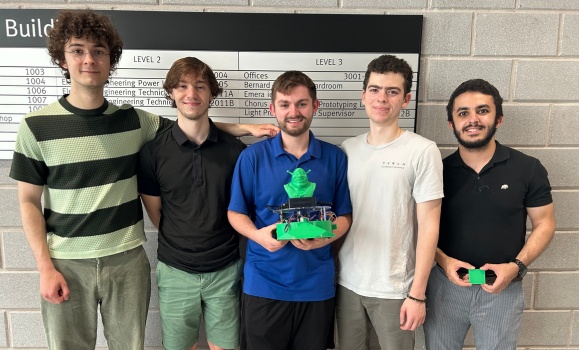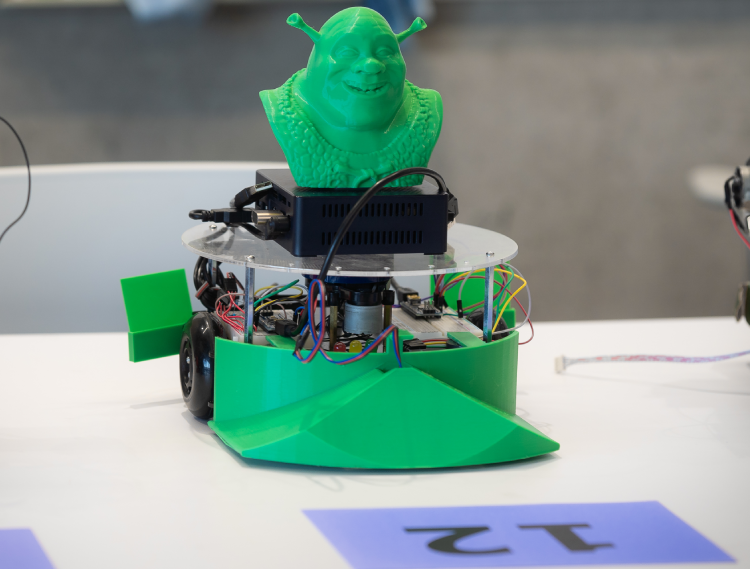News
» Go to news mainElectrical Engineering Students Compete for Top Honours in Annual Robotics Challenge

A large green robotic “ogre” designed and built to look like the character “Shrek” is receiving a lot of attention at this year’s Peter Gregson Robotics Design Competition.
The 10x11” robot sits on a table amongst nineteen other robots designed by 3rd year Dalhousie engineering students enrolled in the electrical and computer engineering design II course. Its differentiating feature is a large 3D printed Shrek head it carries on its back.
“I’ve actually never watched the Shrek movie,” jokes 3rd year student, Mohammed ali Khalaf who built the robot along with his teammates Gregory Bowes, Vlad Chiriac, Roee Omessi and Nick Rockwell.
At the start of the semester, student teams in the course were provided with a base robot, a tool kit and a $300 budget to design and build an autonomous robot that competes at the design challenge.
“We had a robot and it kind of looked like the character “Thomas the Tank Engine,” says Khalaf. “But Greg had an old Shrek figurine sitting on his shelf, so we ended up going with that.”

The team calls the robot, the Shrekinator. Now as they wait for their turn to compete at this year’s design challenge, they admit that the robot’s popularity has made them a little extra nervous for competition.
“The boys feel anxious,” laughs Khalaf. “I feel exactly how I would feel if I was in an NBA championship. This has been the most climatic moment of my life.”
Peter Gregson Robotics Design Challenge
Khalaf says he been anxiously waiting to participate in the Peter Gregson Robotics Design Challenge since the moment he signed up for the design II course.
“Everyone who goes into this class knows about this project and we’re aiming for first place here today. Top honours.”
The annual competition, which is taking place this year in the Atrium of the Emera Idea Building, is a full-day event that features automated robots competing in an obstacle course race. Their challenge: perform certain tasks while avoiding multiple obstacles. The competition gives students the opportunity to test their engineering skills, creativity, stamina, and teamwork.
“There are no remote controls used in the competition,” adds Khalaf. “The robots act on their own. They don’t talk to any outside sources.”
When the time comes for his team to compete, Khalaf carefully places the Shrekinator on the obstacle course. From there, it slowly navigates its way around the route. It gets stuck a couple of times along a wall, in the end completing the course on its third attempt. The team receives a respectable 90 per cent score.
“The hardest part of the obstacle course is navigation,” says Khalaf. “It’s unpredictable because it’s a very advanced system. It’s not like you hit go and it’s the same thing every time. There’s always a chance that the robot will do something that you didn’t expect it to do.”
Rewarding Experiences
Win or lose, Khalaf says the design challenge has so far been the most rewarding part of his academic career.
“It’s definitely the best experience we’ve had building our teamwork skills. Both with our own group and between other groups as well,” he says. “There’s no way to get the robot working if you’re not working together.”
“As we got closer to the test day, all the teams were sharing materials with each other, and we got a lot closer as a class.”
Khalaf says the community spirit and positive energy made the long hours enjoyable and manageable. This despite doing a final test on their robot at 3:20am the night before competition.
“The 24 hours challenge was an experience. Frisbee in the field at 1:00am when we were waiting for our turn to test the robot on the obstacle course, then McDonalds, it was great,” he enthusiastically says.
Proud of both his team and classmates, Khalaf says he feels grateful for the opportunity to have gained such valuable hands-on experience from his design course.
“Someday we’re going to be working with companies where we will have a project that we’ll need to demo. If the CEO is watching, you need to be ready for that kind of pressure. This experience (robotics challenge) for me has been the best practice so far,” he says.
“Our electrical engineering course really teaches you to be confident with your design and work. And if we’re talking about class quality and structure, this is a good as it gets.”
Recent News
- Blending the magic of engineering at the happiest place on earth
- Hands‑On Learning in Action: Students Gear Up for Peter Gregson Robotics Design Competition
- 2024 Engineering Golf Tournament
- Dalhousie Honours Dr. Ted Hubbard for Excellence in Educational Innovation
- Empowering youth and transforming communities: Celebrating International Women in Engineering Day
- Hydrogen Applications Research Lab Tour
- Unlocking the power of green hydrogen
- Deputy Prime Minister Freeland Champions Federal Research Investments at Dalhousie's Water Quality Lab
